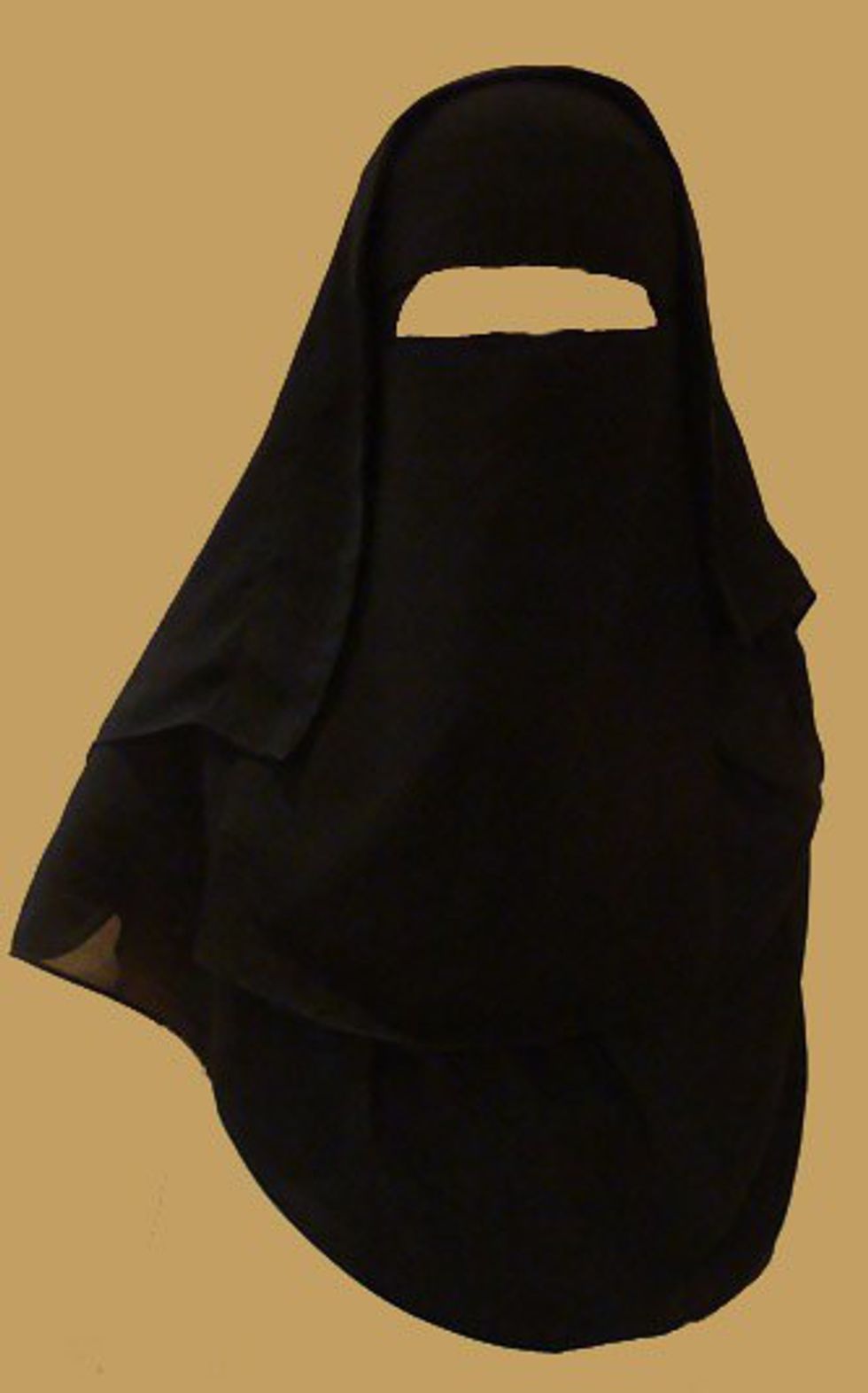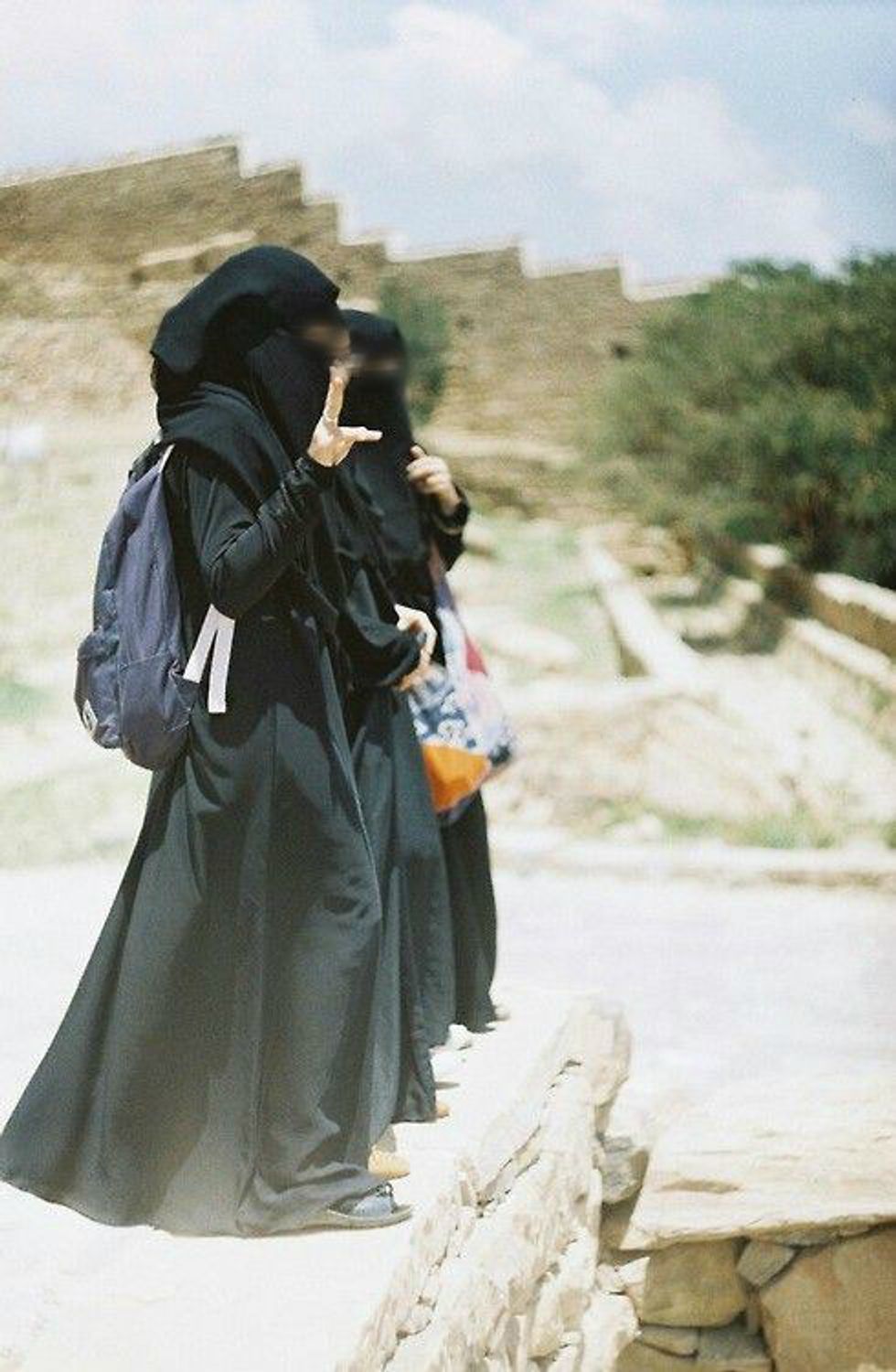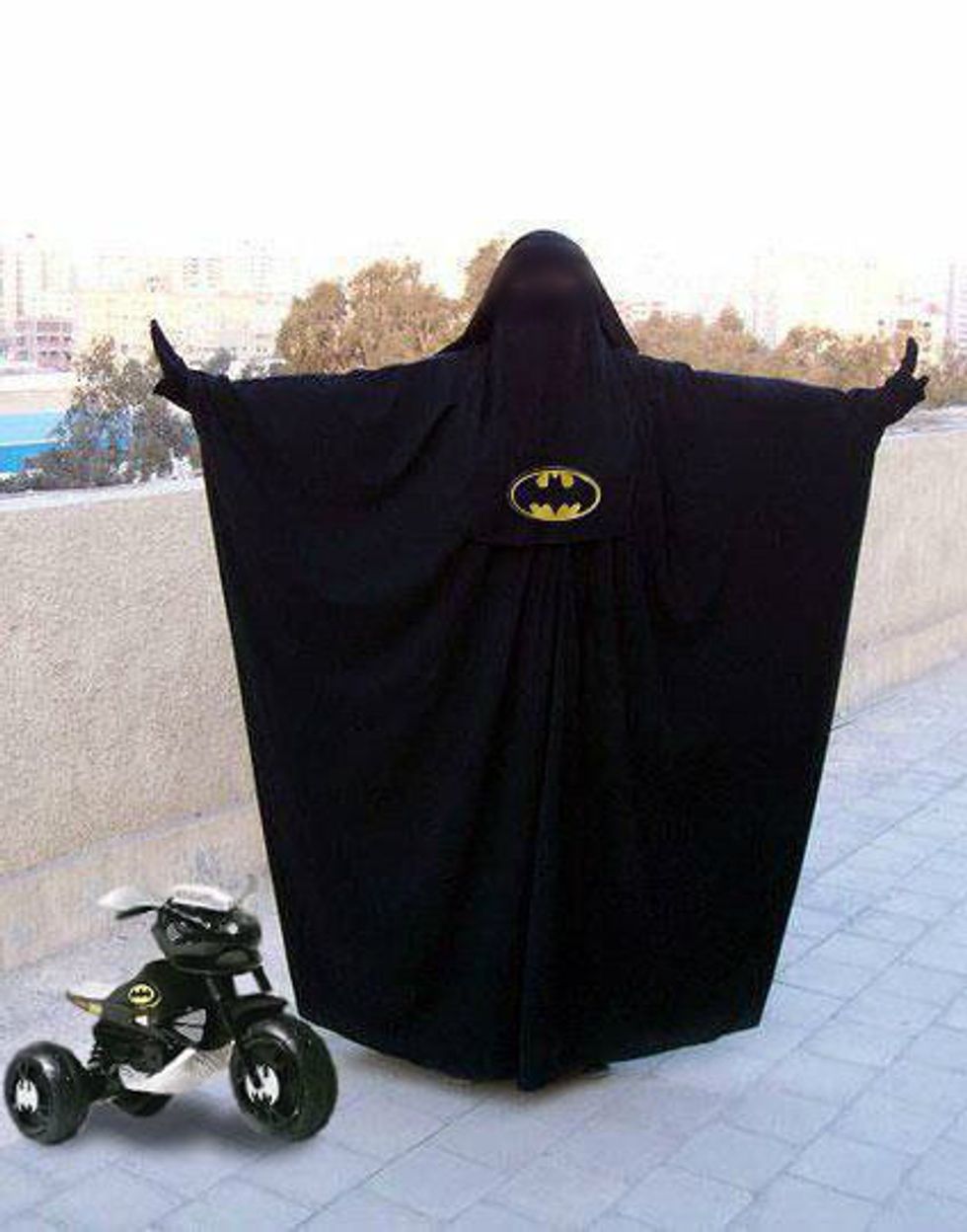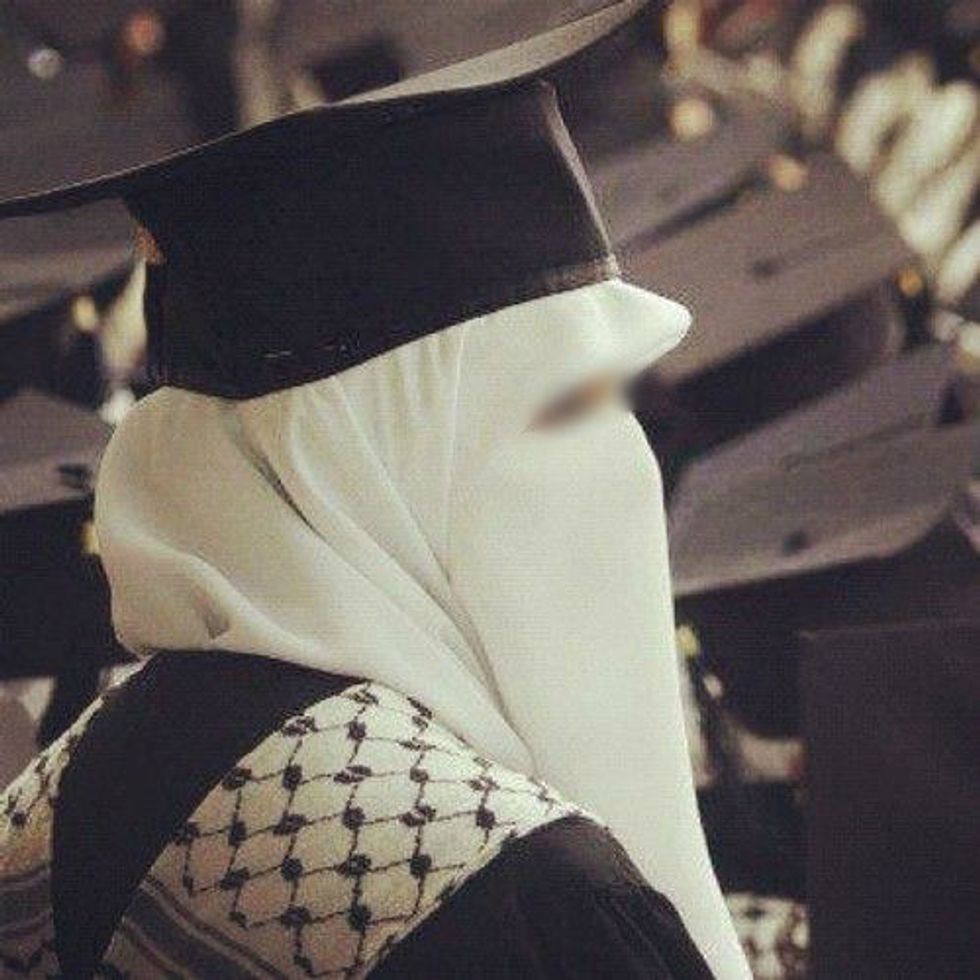When you see a woman wearing a face veil, what do you do? Do you try speaking to her? Or do you hurry through the aisles, trying to suppress the questions surfacing in your head? How do you feel?
What do you feel exactly?
Many European countries have banned the niqab (face veil) because of what they feel – from France, who felt it wasn't "dignified" and "a barrier to Muslim assimilation in French society", to Germany, who recently outlawed the veil to promote "cohesion in [German] society" as more refugees arrive.
And there's the problem.
When powerful nations take away the rights of minority individuals in order to appease society, they do not promote assimilation and integration. Instead, they promote a lack of tolerance, diversity and empathy in their communities. Countries where being "foreign" is considered a negative trait and being "Muslim" is a connotation for terrorist are now dealing with the eruption of mayhem in their societies.
Since France banned headscarves in school, outlawed the niqab altogether and began prohibiting burkinis, French society has become increasingly Islamophobic.
Britain's troubles became apparent right after the Brexit was passed, and the frequency of hate crimes spiked. In British society, the segregational lines between races, religions and cultures have deepened over time.
Veiled Muslim women also struggle to be accepted in the United States, where there is a widespread misconception that the niqab severely impairs communication between people. This is not the case. I would know, because I am a Muslim niqabi living in the United States.
The niqab empowers me and a variety of Muslim women to be confidently assertive, expressively clear and Islamically goal-orientated.
So what does that mean?
Well first thing's first, what is a niqab?
A niqab is a face veil that covers a woman's entire face except for her eyes.
Some niqabs come in layers, where the first-most layer looks like the image above, followed by a second, thinner layer of sheer cloth through which the woman can see but others cannot see her eyes clearly. A few niqabs also have a third layer of sheer cloth for design or use, depending on how many layers the individual chooses to wear.
Here's a three-layered niqab with the only first and second veil drawn down over the face.
A woman who wears the niqab is called a "niqabi". Being a niqabi means the woman covers her hair (hijab), covers her body (abaya) and covers her face (niqab).
For kids, that means a niqabi is a ninja. I have yet to meet a child who disputes my ninja status, and honestly, that's one stereotype I'm totally ready to embrace.
Because the niqab symbolizes religiosity, oftentimes veiled Muslim women are stereotyped as "submissive" and lacking personality. This assumption is not the fault of the niqabi. It is the fault of the people who pigeonhole veiled Muslim women based on their assumptions about a piece of cloth covering a person's face.
Yes, covering oneself (for both males and females) symbolizes modesty in Islam, but the niqab itself does not define a woman's character and religiosity all on its own. The veil is just one of the many defining traits of the woman wearing it. Wearing a niqab does not guarantee that the woman is a good or bad person. In fact, wearing a niqab only symbolizes one thing: an association with Islam.
To understand a niqabi's mindset and experience her personality, you must interact with her. To learn more about anyone, you have to get to know them!
Niqabis are humans. We are people. Don't assume that what you see (or what you don't see) is all there is to a person. Reach out to people, interact and always have an open mind and open heart – only then can you begin to understand.
Is the niqab an Islamic obligation?
Yes, it is.
The proof can be found in the Quran and the Hadith. Here are just some of the quotes proving that niqab is obligatory in Islam:
Allah Ta'ālā says in Surah al-Ahzāb, verse 53:
"O prophet, tell your wives and your daughters and the women of the believers that they should draw down their jilbāb (shawls) over them."
The method of dawning the jilbāb is a point of contention amongst the 'ūlamā; Imam Qurtubi mentions in his tafsīr:
"People have differed in regards to the method of dawning it (the jilbāb). Ibn 'Abbās (radiyallahu 'anhuma) and 'Abīdah as-Salmānī (rahimahullah) state: It means to wrap it up in such a way that everything is concealed except that (the area of) one eye is left open for her to see with. Ibn 'Abbās (radiyallahu 'anhuma) (in another narration) and Qatādah (rahimahullah) say: It means to wrap it up above the forehead and to fasten it, then to fold it till above the nose even if both eyes are left open; although, she will have to cover her chest and majority of her face. Hasan (rahimahullah) says: She will cover half of her face." [Ibid]
Narrated Safiya bint Siba: 'Aisha used to say: "When (the Verse): "They should draw their veils over their necks and bosoms," was revealed, (the ladies) cut their waist sheets at the edges and covered their faces with the cut pieces." Volume 6, Book 60, Number 282: (Sahih Bukhari)
In a short talk, Mufti Menk explains how people should always continue to do their best to become better Muslims.
Does the niqab impair communication?
To some extent, yes. That's part of the reason why it's worn.
The niqab impairs communication with men and women who are not permitted to see the wearer's face. In front mahrams, however, a niqabi does not have to cover her face.
If (without a legitimate reason) Muslim women do not properly cover (with hijab, abaya and niqab) in front of non-mahrams, it is a sin – even if the Muslim woman doesn't cover herself at all. This is because veiling oneself is compulsory in Islam.
Further detail about the niqab can be found in the Quran (translation and tafseer, which is interpretative commentary by Islamic scholars), the Hadith and other trusted sources, such as certified Muftis like Mufti Menk, who has many funny, engaging lectures available on YouTube.
But contrary to all the black cloth you may see, any covered Muslim can wear colorful clothing, as long as it remains within modest boundaries.
My niqab empowers me to confidently assert myself.
Personality is expressed through a person's words, actions and behavior. When I choose to wear my niqab in a different style or pair a complimentary colored hijab (headscarf) to my abaya, I am personalizing my clothing to fit my style while still maintaining religious modesty. There is no need to sacrifice my religious values to reassure people that I'm wearing what I choose to wear. Rather, society should realize and accept the fact that most Muslim women voluntarily wear the niqab and are perfectly capable of expressing themselves with it.
Just because my entire body is covered in one long, loose dress (abaya) doesn't mean my body language and nonverbal cues cease to exist. I can and still do cross my arms when thinking something over, use hand gestures when explaining and tap my feet when impatient. My body language may be less conspicuous, but it's still there if anyone cares to pay attention.
However, there are some nonverbal cues that I have to do without, such as raising an eyebrow or flashing a smile. I compensate for those by emphasizing other nonverbal cues, like scrunching up my eyes when confused or flashing the "eye-smile" to show that I'm happy. I will never forget how excited one professor became when he figured out that he could tell exactly what facial expression I was making, just by familiarizing himself with my quirks and vibe.
Yes, I have a limited amount of nonverbal cues I can use, but I make up for that by using my voice.
My niqab empowers me to be expressively clear.
I used to be the kid who sat in in the back with a perpetually anxious look on her face – never raising my hand to participate in class or ask for clarification. I got away with keeping mum, just by scrunching up my face and primarily using nonverbal cues to communicate. This bad habit persisted until I got to college where I began covering my face. I could no longer compensate for conversation using nonverbal cues to avoid the fear of verbally asserting of myself.
Two things became clear within the first week of class: I would have to assert myself, and I would have to speak in a slightly different manner.
If I wanted to understand something better in class, I had to raise my hand and ask, because the professor couldn't see me raise my eyebrows in interest. If I wanted to voice opinion to add to a discussion, I had to pay close attention to the timing between people's conversations to seize my chance to talk without sounding abrupt.
Not many people notice this, but when others are speaking to them, people tend to focus on the person's facial features and mouth when "listening". Instead of simply relying on a person's voice to understand what is being said, some people watch the words being said from the person's mouth to properly "hear" what is being said, even if they no longer need to. Children and those who are hard of hearing often use nonverbal cues and "lip reading" to match a speaker's tone of words with the corresponding facial expressions shown to grasp the meaning of what is being said. But most adults are already able to associate a person's tone to a corresponding facial expression, without looking at someone's face. So while the facial expression can play a beneficial role, it's not an absolutely vital component of communication.
The niqab does limit interface contact, but it does not hinder people from interacting with one another. You just have to converse in a slightly different way with person wearing it.
In my case, I learned to be speak louder with people I was meeting with the first time. People who are not used to speaking with or listening to a niqabi may need to remind themselves to focus on understanding the words being spoken by the niqabi rather than searching for facial cues to fill in the blanks. After a minute or two of getting used used to me, people often naturally adjust to this discrete method of communication.
Also, it is imperative that I speak clearly and inject emotion into my voice. If I'm happy about something, I let my the tone of my words or the movement of my body emphasize the emotion. This helps people quickly familiarize themselves with my character. When people relax and casually interact with me, all the supposed barriers of communication topple, because we are taking the time to understand one another.
My niqab empowers me to be Islamically goal-orientated.
There are numerous reasons why I am privileged for being a Muslim American niqabi, and the most fundamental reason is because Allah (SWT) guided me to the niqab, so I was able to take the next step to strengthening my faith.
Because the niqab limits communication with non-mahram (aka, ghayr-mahrams – those who the person must cover in front of), it acts as a barrier to reduce the possiblity of sinful behavior for both genders, since men must also cover themselves and lower their gaze, according to Islam.
The hijab, abaya and niqab all honor Muslim women with sole ownership and control over their bodies in an Islamic manner. Like dazzling diamonds, Muslim women only show their beauty to those whom they choose to uncover in front of, in accordance to what is permissible. Wearing the niqab empowers me to incorporate Islam into every aspect of my life and strive for success in this world and in the hereafter.
Wearing the niqab does not prevent me from traveling, eating, showering, marrying and obtaining an education – among many other things. In fact, it encourages Muslim women to be assertive. Many Muslim women, from as far back as the seventh century, are renowned for being highly educated:
Urwa bin Zubayr stated: “I did not see a greater scholar than Aisha in the learning of the Quran, shares of inheritance, lawful and unlawful matter, potery and literature, Arab history and genealogy.”
Zaynab bint Ahmad (d.740/1339), usually known as Bint al-Kamal, acquired ‘a camel load’
of diplomas
; she delivered lectures on the Musnad of Abu Hanifa, the Shamail of alTirmidhi,
and the Sharh Ma’ani al-Athar of al-Tahawi, the last of which she read with
another woman traditionist, Ajiba bin Abu Bakr (d.740/1339)
Ibn al Jawzi from Hisham bin Urwa that Urwa said to Aisha i, “Umm, I am not surprised at your knowledge of poetry since you are the daughter of Abu Bakr and he was the most knowledgeable of people in poetry, but I marvel at your knowledge of medicine." - (Hadith 2210 via Maryam Institute)
In fact, Imam Hakim Naisapuri states: “One fourth of our religion [Islam] depends on the narrations of women. Were it not for those narrations, we would lose a quarter of our religion.”
Covered Muslim women have contributed enormously to all facets of life, including edification. Their voices are not suppressed by Islam. They are not weak for treating themselves with respect and expecting others to do the same. The niqab has freed me and numerous other Muslim women from the societal pressures and matters of this world, allowing us to ascend to a level of imaan (belief) that will grant us entry into everlasting paradise.




























